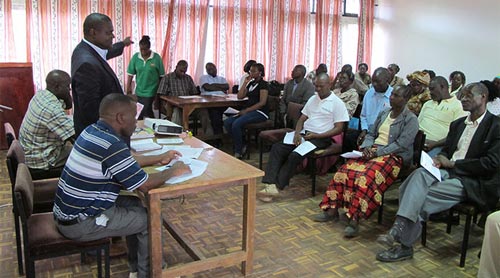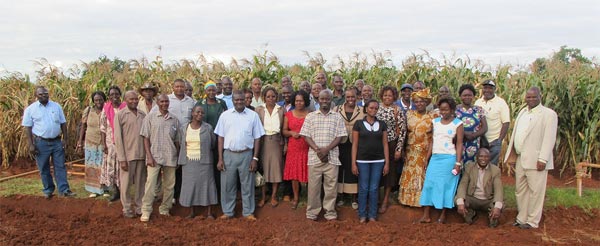 On 02 May 2013, the Water Efficient Maize for Africa (WEMA) project organized a sensitization workshop for local community leaders, provincial administration members, agricultural extension workers, farmers, and representatives of farmer groups. The meeting was held at the Kenya Agricultural Research Institute (KARI) in Kiboko and attracted over 40 participants from the neighboring maize growing areas in the Makueni and Machakos counties in eastern Kenya, along with representatives from CIMMYT, Monsanto, African Biotechnology Stakeholders Forum, and the Ministry of Agriculture. It aimed to explain WEMA’s work on development of drought-tolerant and insect-resistant maize varieties using both conventional and genetic engineering techniques. It was also an opportunity for WEMA to demystify myths, allay fears, and enlighten participants on genetically modified organisms (GMOs) and confined field trials.
On 02 May 2013, the Water Efficient Maize for Africa (WEMA) project organized a sensitization workshop for local community leaders, provincial administration members, agricultural extension workers, farmers, and representatives of farmer groups. The meeting was held at the Kenya Agricultural Research Institute (KARI) in Kiboko and attracted over 40 participants from the neighboring maize growing areas in the Makueni and Machakos counties in eastern Kenya, along with representatives from CIMMYT, Monsanto, African Biotechnology Stakeholders Forum, and the Ministry of Agriculture. It aimed to explain WEMA’s work on development of drought-tolerant and insect-resistant maize varieties using both conventional and genetic engineering techniques. It was also an opportunity for WEMA to demystify myths, allay fears, and enlighten participants on genetically modified organisms (GMOs) and confined field trials.
In his opening remarks, E.O. Mungabe, KARI-Katumani center deputy director, noted that the use of genetic engineering in crop breeding still triggers panic among some Kenyans. However, the emerging challenges of climate change, diseases such as maize lethal necrosis, and pests like the larger grain borer call for new approaches, as conventional ways of breeding alone might not overcome or solve these problems. “It is necessary that we combine our conventional breeding techniques with genetic engineering to effectively respond to these emerging challenges. Think positively of genetic engineering as a technology that has the potential to address them,” Mungabe explained the situation to the participants. “Africa is a drought-prone continent with approximately 300 million people depending on agriculture for their livelihood,” said Murenga Mwimali, WEMA-Kenya national project coordinator, reminding participants that due to climate change, the incidences and severity of droughts will increase. Combined with insect and pest attacks, this could make maize farming an unrewarding enterprise if these issues are not addressed. Mwimali then briefed the participants on the progress todate in developing drought-tolerant and insect-resistant maize varieties using biotechnology and conventional breeding techniques. “Trials show that these new varieties,” Mwimali added, “will yield 25% more than commercial hybrids.”
Joseph Bii of KARI-Kiboko Rangeland Research Station stressed that 80% of Kenya’s land is classified as arid or semiarid. It is therefore important to develop maize varieties that can tolerate the little and erratic rainfall experienced in these areas to enable farmers to continue the production of Kenya’s main staple crop and an important fodder crop for livestock, maize.
The meeting then focused on the topics of GMOs and confined field trials within the scope of WEMA. The project has so far conducted four confined field trials for genetically modified drought tolerant maize variety MON87460 with promising results; another currently conducted confined field trial with genetically modified maize variety resistant to stem borers (MON810) is progressing well. It might take a few more years before farmers can plant the genetically modified maize varieties, but the drought-tolerant CKH110078 conventional variety developed from the Drought Tolerant Maize for Africa (DTMA) materials is likely to be available this year, according to Mwimali. In addition, 14 water efficient WEMA hybrids are already in national performance trials in Kenya and could, therefore, be released as early as next year.
The participants welcomed the opportunity to exchange ideas and get clarifications on many GMO issues: sources of seed and price implications; implications of recycling seed; cross-pollination of GMOs with their local varieties; as well as the reasons why WEMA has not improved local varieties such as Kinyanya. The farmers were also advised on sources of seed and appropriate varieties for their region, particularly the Ministry of Agriculture and the Kenya Plant Health Inspectorate Service through their SMS service, and warned against relying on agro-dealers for information as they are in the business to sell.
The stakeholders toured the MON810 trial and the WEMA confined field trial facility, where they had a chance to observe a genetically modified crop for the first time. It was heartening for the meeting organizers to hear most of the farmers speak positively of the technology and the varieties in the trial, with many expressing their eagerness to try out the genetically modified varieties.

 Capacity development
Capacity development 
